- Home
- P. D. James
Time to Be in Earnest Page 26
Time to Be in Earnest Read online
Page 26
I began to imagine what the world would be like, and more specifically what England would be like, a quarter of a century after a catastrophic year in which the human race was struck by a universal infertility. For twenty-five years no one would have heard a baby cry or heard a child laugh. This idea for a dystopian novel was not in itself original; a number of novels explore a world in which mankind knows itself to be dying. The Children of Men ends on a note of hope, but was traumatic to write, and I was glad at the end to return to the less depressing ambience of classical detective fiction. The novel was not intended to be a Christian fable but that, in fact, was what I wrote. It is also different in technique since the whole story is seen through the eyes of a single character and the structure is linear, the plot moving strongly to its dramatic conclusion.
This is the only one of my novels which has not earned its advance, a depressing and somewhat demeaning thought. But it has produced more correspondence and more controversy, particularly in theological circles, than any other novel I have written.
June
THURSDAY, 4TH JUNE
I had a most helpful talk today with Michele Buck, Controller of Drama at United Film and Television Productions, about an irritating complication which has arisen in connection with the televising of a third Cordelia Gray series by Ecosse Films.
For the first time I had decided, after consultations with Carol Heaton and much thought, that Ecosse Films could have the rights to the character so that they could continue to make Cordelia Gray television series, writing original stories. I would have some rights of consultation, but essentially the same thing would happen with Cordelia as happened with Colin Dexter’s Morse. I had confidence in this decision after seeing their Mrs. Brown, a film of quality and great sensitivity. I liked the people at Ecosse and felt that I could rely on their integrity and good faith. And the first Cordelia Gray series confirmed my high opinion. The screenplay was true to the book in fact and spirit, was well acted and directed, and Helen Baxendale as Cordelia fulfilled all our expectations.
I was less happy with the second series, the first real test for Ecosse since this was not based on one of my books. There was some good acting but the pace seemed to me too slow with suspense built up which came to nothing, while Cordelia had become ineffectual, dithering and incompetent, willing apparently to see the case solved and the husband of the victim identified as a murderer without a shred of convincing evidence, forensic or otherwise. The police work was incredible, indeed at times risible.
When I was shown the outline to the proposed plot I stressed that in any detective story the finding of the body is a crucial moment, both visually and in terms of character and plot. I suggested that it would be most effective if the body were found by Cordelia. This would have been psychologically as well as visually effective, since she would have had to face for the first time in the television series the reality of the job she was doing. Instead, when the series was shown, we saw neither the body nor its discovery, and Cordelia, when interviewed by the police, didn’t even ask how the victim had died. I myself still don’t know how she was killed.
And now a fresh complication. I discovered it when sitting under the dryer at my hairdresser’s and looking through Hello! At the back was an article which stated that Helen Baxendale was pregnant but would continue as Cordelia Gray and the plot “would accommodate the pregnancy.” When I got home I rang Robert Bernstein, who said that Ecosse couldn’t wait to film until after the birth but that they had agreed on a plot line. Cordelia would have an affair with an old boyfriend who would then disappear to the United States, leaving her, the brave little woman, to cope alone.
In an attempt to salvage what I could, I wrote in April to Ecosse and suggested that Cordelia could have gone on holiday to Italy, met an old lover who was now dying of a brain tumour, and out of compassion and the remembrance of the past, had had a brief affair. Psychologically Cordelia might have thought that her job as a detective was paradoxically making her too remote from real life, too unwilling to take risks, and that for once she was acting with reckless generosity. I still very much disliked the idea of her becoming pregnant, but at least this would make it more believable. I pointed out that a modern, intelligent, responsible young woman does not deprive her child of a father unless that father is vicious or otherwise unsuitable, in which case presumably Cordelia would not have loved him. I even provided in my note of 7th April a page of suggested dialogue. It was a month before a reply came, saying that they were adhering to the original idea.
I then made it plain through my agent that I wished to dissociate myself from the series and, in particular, to have the overall title, An Unsuitable Job for a Woman, removed. It was because of this that Ecosse had to go to United Film and Television Productions, for whom they were making the series, and the matter came for the first time to Michele’s attention. She totally shares my concern and will do what she can to put matters right, at least as far as the story line is concerned. Robert Bernstein has suggested that we have a meeting, but there is really no point in that. Ecosse have made it abundantly clear that they neither value nor want any input from me and I think I must now concentrate on distancing myself from the series.
Disappointment in the quality of the second series is less important than the way in which Ecosse deliberately kept from me the news about Helen’s pregnancy. I can perfectly understand her wish not to make the news public until after the first twelve weeks, but Ecosse, while agreeing to keep her secret, should have made it plain to her that they had an obligation under the contract to tell me as the author, quite apart from the courtesy due between people in a position of trust.
I feel more cheerful now that Michele has taken the matter in hand. But whatever story line is adopted, the damage, as far as I am concerned, can’t be repaired, since Cordelia with an illegitimate child is no longer my character. During my January tour of the States I was constantly urged by readers to write another Cordelia Gray story and, before this happened, at least that was an option. I am not at all optimistic that we shall succeed in persuading Ecosse to drop the overall title An Unsuitable Job for a Woman. There is, after all, no copyright in titles and I imagine that legally we can’t stop them continuing to use it.
The moral here is never let go of the rights to a character; but effectively one always does that with television. It is remarkable how powerful the television companies are and how much control over their work authors lose under the normal television contracts. But most of us are only too happy to have our books televised. The medium is so powerful that inevitably it brings readers in thousands, at least to the paperback editions. And on the whole I have been lucky, first with Anglia Films and now with United Film and Television Productions. When the Anglia film of Death of an Expert Witness was made in 1983 it was, as far as I remember, in seven hourly episodes. Today we are lucky to get three. This is due more to financial restrictions than to new methods of direction, although they do play a part. The more leisurely development of plot and character is seldom possible now.
Talking about television with my friends who have also had their works adapted for the small screen, I find we agree on a number of dos and don’ts which it would be useful, but alas impracticable, to include in the contract. Here, in the unlikely event that any television producer or director is interested, are our main points:
Don’t attempt to televise a novel unless you are really interested in the work. Too often it seems that you are interested only in acquiring the title and the name of the author, and are then happy to proceed with something which bears very little resemblance to the original work.
Novelists accept that television is a visual medium and that things may have to be shown which are otherwise described. But consider first whether the actors could actually communicate in words rather than have everything shown in pictures.
Don’t fundamentally alter the chief character. With Dalgliesh, the first director decided, as he told me, to bring him down-ma
rket. I had, after all, decided to create a detective who was the son of a Norfolk vicar. That had been my choice and I don’t see why television should decide that this was altogether too middle-class for their purposes.
Where there is original dialogue, why not use it as far as possible? I was very lucky with the Anglia treatment of A Taste for Death, one of the best of the Dalgliesh series. Dame Wendy Hiller took the novel on the set and frequently remarked: “In the book I say this. Why can’t I say it on screen?” It is interesting that writers who are both good and successful, like John Mortimer, seldom alter the original dialogue; Brideshead Revisited was almost entirely Waugh. I suspect that adaptors who are less successful can’t resist the temptation to have their own words on the screen.
As it may be necessary to cut out incidents and characters, what is the point of adding additional ones?
Must we always have a car chase? Men may like them (although I can’t think why); most women find them boring in the extreme. And if you must have a car chase, must it go on for so long? It need last only as long as it takes us to go and make the tea.
MONDAY, 8TH JUNE
Planning to go to Southwold with Alixe for the weekend, I confidently telephoned a friend, who comes in to feed Polly-Hodge when I am away and who holds a key, but was disconcerted to hear that she was in Gibraltar on holiday—so what to do about Polly-Hodge? I decided to risk taking her. She made some protest when urged into the large wicker basket but was at once silent when the car moved off. We placed the basket on the back seat facing us so that she could both see and hear us. She sat, paws folded inwards, eyes fixed ahead, resolutely resisting the temptation to sleep in case the immense purring creature accompanying us should get out of control.
There were no complaints on the journey until we stopped at a Little Chef on the A12 and decided to have coffee. As soon as we carried her into the café the soft complaining mew began. The waitress at the Little Chef wasn’t happy either and explained apologetically that no animals were allowed. We should, of course, have known this, so we took two polystyrene mugs of coffee out to the car. Alixe had decided after our last foray through the East End that she would take the M40 and then the M25—a longer but, we hoped, swifter route. It worked well both going and coming. We reached Southwold in excellent time for lunch.
There was a sea mist all day on Saturday, the air sweet, soft and warm against the skin. At Blythburgh, looking over the estuary, it was impossible to see if the tide was in as water and sky were an indistinguishable iridescent whiteness. We drove to Snape along the coast road between high banks splattered with red poppies, stopping at Leiston to see the museum, which Alixe hadn’t previously visited. It is well arranged, staffed by volunteers and has the charm and interest of all well-kept local museums. It shows the history of the firm of Garrett’s, who, at the height of their success, made steam engines and agricultural machinery for home and export and employed as many as 700 local people. I particularly liked the agricultural machinery and the large wooden caravan in which the farm labourers ate and slept while at work on the fields. Alixe was moved most by one of the exhibits from the last war: a tattered Union Jack which had lain on the altar of a crude chapel in a Japanese prisoner-of-war camp, had been placed over the coffins of the many dead, and was at last raised when the camp was liberated. There is always a slight melancholy about these small museums; so many lives lived and lost, a way of life gone forever, each grainy photograph a small memento mori.
After the museum we went to the Trading Post, where I bought a Victorian jug and a large Victorian print in its original frame. Some of these prints, although overly sentimental, are beautifully drawn and delicately coloured and seem to have a timeless charm. We loaded it in the back of the car then went on to Snape for lunch at the pub, the Plough and Sail. It was warm enough to eat outside in comfort and we enjoyed roast lamb, perfectly cooked vegetables and sticky toffee pudding fresh from the oven, which was among the best I have ever tasted. I had thought that the sticky toffee pudding at the Ivy could not be bettered, but this was its equal. To eat a cold meal in the fresh air is always agreeable, but to enjoy a well-cooked hot meal is a particular and rarer delight.
After lunch we went to Aldeburgh, parked the car and walked along the beach before returning to Southwold by the coast road. Nettie de Montmorency came at six o’clock to drink red wine and to keep us abreast with local news. We then spent a lazy evening watching a video of A Room with a View.
On Sunday to Holy Communion in St. Edmund’s Parish Church at eight o’clock. I had expected the service to be held in the Lady Chapel with the usual small group of worshippers. Instead there was a substantial congregation in the main body of the church. Most of them, admittedly, were old. I suppose, like myself, they were people who prefer the 1662 liturgy, have an aversion to sermons and prefer to worship early in the day. What one misses, of course, is the music. The rest of the day we spent gardening to good effect, Alixe being particularly adroit at tying up the tangled and top-heavy clematis and training the honeysuckle under the kitchen windows while I more prosaically tackled the weeds between the crevices of the York stone. There was one bright green weed which had encroached like a carpet over a large part of the stones but, because of the recent rain, was quite easy to handle. I could insert a trowel under the edging and then roll it up like a rug, a highly satisfactory procedure that was to show the carefully designed pattern of the stones for the first time.
Later we walked along the promenade towards Walberswick, then back along the beach under a sky rapidly changing from dark blue to black. But the rain held off and, tired, we were able to lie on the pebbles. They are surprisingly comfortable, providing one chooses the right spot where the pebbles are small and can be used rather like a bean-bag, accommodating themselves to jutting bones and curves. It was wonderfully peaceful lying there, looking up at the moving clouds and hearing always the fall and retreating hiss of the waves. I wish I could so order my life that this could happen more often.
Polly-Hodge adjusted remarkably well to the new house. Clare had taken her cat, Charlie, to Southwold and had left a litter tray with a packet of litter in the understairs cupboard. I placed the tray for Polly-Hodge in the conservatory, together with a saucer of water. She drank, and then immediately squatted on the tray, which seemed to me remarkable considering that I have had her for at least ten years and she has never had to use a tray. Then she explored every room in the house, sniffing and obviously defining her territory. Eventually she totally disappeared. We knew that she was upstairs but the most detailed search failed to find her. We even got to the expedient of foolishly opening cupboard doors and drawers which had been shut and which she couldn’t possibly have got into. Then Clare phoned and reminded me that Charlie had behaved in just such a way. “She’s in the bathroom,” she said. “You’ll probably find her behind the two wash-basins.” I protested that there was no room behind the two wash-basins, but Clare pointed out that if I lay down flat and looked into the knee-hole between the basins then reached up with my hand, I would find a very narrow slit between the back board and the wall. That is where Charlie had been. I swathed my arm in a towel and then gently inserted it, to be met at once by a hiss and by the appearance of a white furry head. So Polly-Hodge’s secret was discovered. She had demonstrated such a degree of ingenuity, not to mention a little malice, that she was thereafter confined to the sitting-room, the kitchen and the conservatory.
Today, Monday, we had an early lunch and were on our way by half-past twelve. The drive back took three hours, not unduly long. Joyce was here to welcome us. Polly-Hodge went to the back bedroom at the top of the house, which she rarely visits, and immediately fell asleep.
WEDNESDAY, 10TH JUNE
This evening Ruth Rendell and I held a conversation on “The Art of Writing Crime Fiction” at the Royal Geographical Society in aid of the Notting Hill Housing Trust Limegrove Appeal. This was part of a series of literary evenings to raise money for a new centre fo
r West and Central London’s homeless people. The Centre will contain forty single bedrooms instead of the usual dormitory accommodation, a doctor’s surgery, a subsidized canteen, advice on finding a job and on educational opportunities including computer training, a quiet room for study, showers and a laundry—all the facilities, indeed, to enable homeless young people to rebuild their lives. The facilities will be open during the day to London’s rough sleepers, of which there are, I understand, about 2,000 each night. Ruth is one of the Appeal Patrons and before we began speaking gave a brief talk on what the Appeal hoped to achieve.
Ruth and I have taken part in a number of similar events, always for charity. Each event follows the same pattern; we have no chairman and sit together on the platform to talk about our craft, taking it in turns to initiate the conversation. We usually cover the same subjects—how we became writers, why we write crime novels, problems of technique, our differences and similarities—but no conversation follows precisely the same pattern and the level of success depends as much on the response of the audience as it does on us. Tonight was a good evening with a chance to meet a number of friends at the reception before we began. We took questions after the talk and then signed books.
Several people, presumably some of them dealers, came with early editions to be signed. It is dispiriting to see how many of these are now hardly readable with the stuck bindings coming loose and—worse—the paper browning. We are perpetually being reminded of the importance of reading and the written word, yet publishers apparently have given up producing books which will last for more than a few years. I accept that much crime writing is ephemeral, but need it be so ephemeral? Before this appalling deterioration in standards, readers could buy a hardback copy of a favourite author in the knowledge that it would be a permanent acquisition for their personal library, to be read and re-read, handled with pleasure and handed down to the next generation. Unless something is done to restore standards we shall have no libraries in future, either national or personal. The reason for the present shoddy productions is, of course, money, but I would have thought that it would pay publishers to bring out at least a limited number of the most important twentieth-century writers in a form which would endure.

 The Skull Beneath the Skin
The Skull Beneath the Skin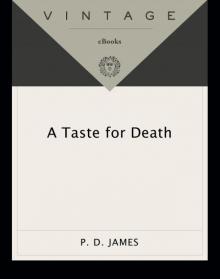 A Taste for Death
A Taste for Death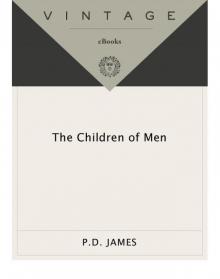 The Children of Men
The Children of Men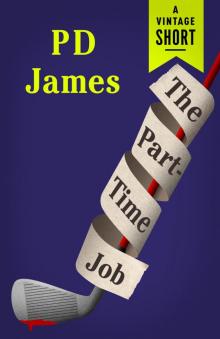 The Part-Time Job
The Part-Time Job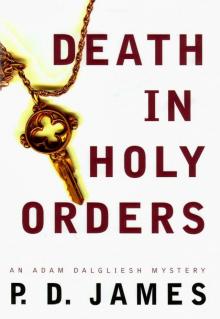 Death in Holy Orders
Death in Holy Orders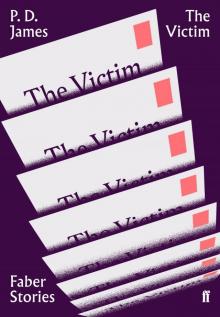 The Victim
The Victim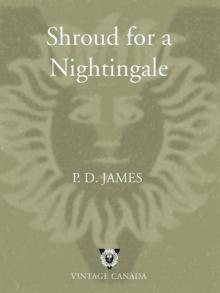 Shroud for a Nightingale
Shroud for a Nightingale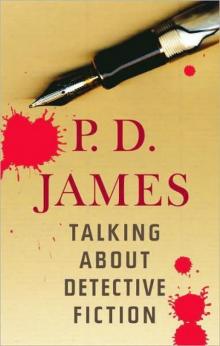 Talking about Detective Fiction
Talking about Detective Fiction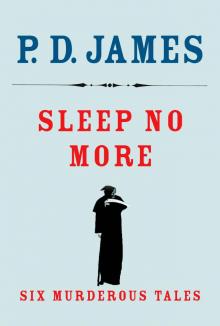 Sleep No More
Sleep No More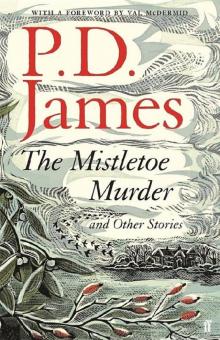 The Mistletoe Murder and Other Stories
The Mistletoe Murder and Other Stories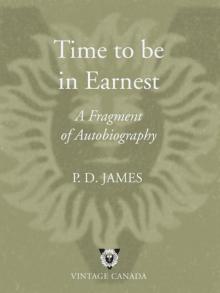 Time to Be in Earnest
Time to Be in Earnest Original Sin
Original Sin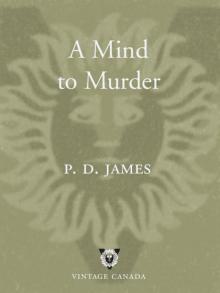 A Mind to Murder
A Mind to Murder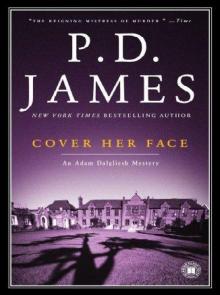 Cover Her Face
Cover Her Face Innocent Blood
Innocent Blood Devices and Desires
Devices and Desires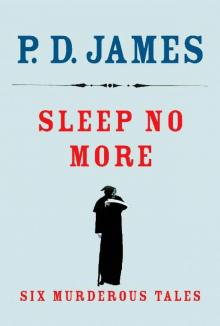 Sleep No More: Six Murderous Tales
Sleep No More: Six Murderous Tales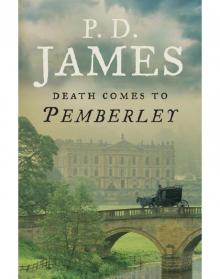 Death Comes to Pemberley
Death Comes to Pemberley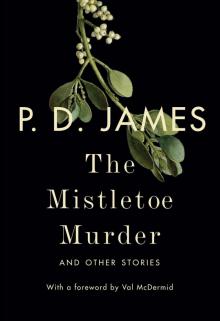 The Mistletoe Murder
The Mistletoe Murder Death of an Expert Witness
Death of an Expert Witness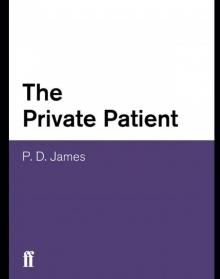 The Private Patient
The Private Patient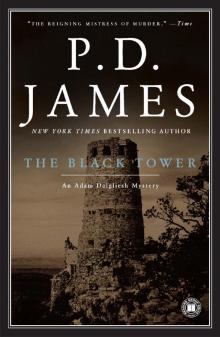 The Black Tower
The Black Tower Devices & Desires - Dalgleish 08
Devices & Desires - Dalgleish 08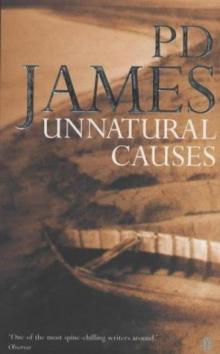 Unnatural Causes
Unnatural Causes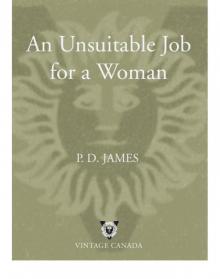 An Unsuitable Job for a Woman
An Unsuitable Job for a Woman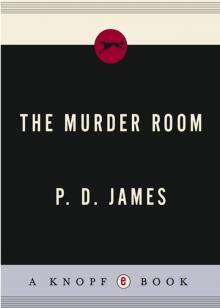 The Murder Room
The Murder Room A Certain Justice
A Certain Justice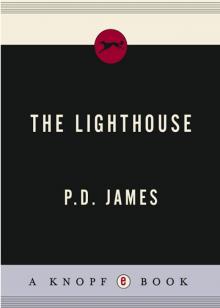 The Lighthouse
The Lighthouse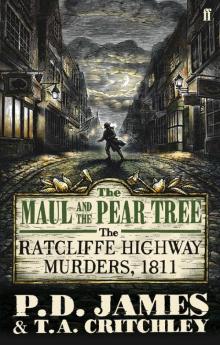 The Maul and the Pear Tree
The Maul and the Pear Tree